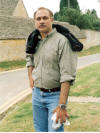|
|
the-south-asian.com July / August 2006 |
|
|||
|
August/September Contents
Sufis - wisdom against 50
years of mountain Heritage cities:
Cotton - the fibre of
|
|
||||
|
Page
5 of 5
Pakistan – Markets in IT & Telecomm Convergent Technologies Part III of the Special report undertaken for the-south-asian.com. The abstracts will be published in parts over the next year. The complete unabridged report is available to interested readers for U.S. $300.00 by Salman Minhas
First published in September 2003 PAKISTAN TELECOMM SECTORS
6.1 Fixed Wireless Payphone ARFEEN GROUP –Fixed Wireless "Foree Phone" & "Na Taar, Na Intizaar". Fixed wireless is already in operation in Karachi by the Arfeen Group. The customer base stations are portable and areas in Korangi, Nazimabad, Industrial SITE area, etc are using the existing AMPS Analog Instaphone Mobile Wireless system towers of the Arfeen Group. Fixed wireless Hawkers in Karachi are going to the doorsteps of houses offering phone call services under the brand name "Foree Phone" and "Na Taar Na Intizaar". The payphone has come to the customer’s doorstep. Because the Instaphone Wireless transmission Towers are already installed, there is little additional cost of installation. Arfeen plans to do this all along its transmission towers from Karachi to Peshawar. The technology used in this project is CDMA from USA Qualcomm and the vendor installing these systems all along the roads from Peshawar to Karachi is from the Chinese company ZTE . ZTE has signed similar contracts with the Indian Telecoms company BSNL. This fixed wireless phones are as of April 2003 now in operation and being sold as PCOs in Islamabad, Lahore and Peshawar. With the introduction of this value-added service, telephone customers who do not have an ISD phone connection will have the facility to make international calls using a pre-paid calling card. However, it is generally believed that PTCL will have more to lose once this service is introduced. Currently, PTCL customers log approximately seven million minutes per month as outgoing traffic on the international gateway. If the pre-paid calling card operators decide to transfer part of the discount obtained from PTCL to their customers, their international calls will become more economical as compared to PTCL's service. In addition to the aforementioned service, a total of 200,000 wireless local loop lines, to be used as payphones in rural and densely populated urban areas nation-wide, are to be installed. Telecard and World Call have been short-listed to install 150,000 and 50,000 lines respectively. These firms have not yet received permission to start their service, but Telecard estimates that once license is issued, it will need only 20-30 days to start operations. 6.2 Paging Services: 1995-2000 Radio paging service was introduced in Pakistan in 1989. Although nineteen companies were given licenses for providing this service, presently, Digital Radio Paging (Pvt.) Ltd. is the only operator in this segment as it has obtained a "stay order" from a court of law to prevent other entrants. It is estimated that Digital has a customer base of more than 14,000. Digital Communications a indigenous Karachi based Pakistani firm , which manufactured the first digital small [ 8 x 32 ] telephone exchanges , had a exclusive monopoly when it started paging services in metro areas in Pakistan in 1995 . Pagers from Motorola were used and the cost was reasonable at Rs 4000 a pager with a monthly cost of some Rs 500. However with the introduction of Mobilink’s and Ufone GSM mobile phone services this section of telecoms has almost become defunct. This due to the fact that incoming mobile calls are not charged in Pakistan and therefore the mobile phone functions as a pager . 6.3 Next Generation Wireless NetworksPakistan’s first CDMA wireless network was launched by Telecard - a local private telecommunication company - heralding the era of 3G network in this part of the world. The network brings Wireless Local Loop technology to Pakistan which has proven as a break through in achieving high ‘teledensity’ targets in developing and under developed countries. The service was launched in Karachi this year and has been extended in Hyderabad, Mirpurkhas and Larkana. Ufone, the sister cellular concern of the state-owned telecom upgraded its existing GSM network to GPRS in December. GPRS is a 2.5G technology which enables mobile subscribers to remain connected to the internet all the time. GPRS enabled mobile devices and phones can enjoy a theoretical throughput of 20 kbps which is sufficient for most of the text based Internet applications such as email and chat. Satellite Telephony services were offered by Thuraya, an International Satellite Telephony operator in a joint venture with PTCL at affordable local tariffs. Acting as a perfect complement to the cellular service, the satellite telephony service expands the coverage of telephony services to every nook and corner of the country. 6.4 Wi-Fi or 802.11a, 802.11b, 802.11g Wireless LAN’s Since the early part of 2003 Wireless LAN’s have become almost a disruptive technology in USA and Europe [wireless networks also known as hot spots have started to sprout / mushroom in various cities in USA and Europe ] . Some of the most well known are "Starbucks" in USA with "Boingo" as the ISP, Borders and McDonalds. McDonalds does not seem to be the right place with its plastic chairs . Borders is most likely to be the most successful as students and readers go there to do a lot of work which require notebook PC and Internet... Initially some of the universities have started using Wi-Fi networks in University of Engineering &Technology in Taxila and Peshawar- the student hostels as well. AIR Force University in Islamabad plans to start installing a small number of Wi-Fi stations connected to its high speed DSL Internet Link with MicroNet Broadband. *****
|
|||||
|
Copyright © 2000 - 2006 [the-south-asian.com]. Intellectual Property. All rights reserved. |
|||||
